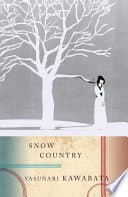Exploring the Enchanting Beauty of Japanese Landscapes in Literature
Dive into Japanese literature that captures the serene beauty of its landscapes and seasons through vivid storytelling, offering profound escapes into Japan's natural splendor.

Books Featured in This Article
Explore the books discussed

Exploring the Enchanting Beauty of Japanese Landscapes in Literature
Japanese literature is well-renowned for its profound connection with nature and the intricate portrayal of landscapes. For readers seeking an escape into the serene beauty of Japanese landscapes, there are numerous literary works that paint a vivid picture of Japan’s natural splendor and traditional ways of life.
Have you ever found yourself longing to escape into a world of tranquil beauty, where the changing seasons paint a mesmerizing picture of the landscape? Japanese literature offers readers a doorway into such a world. The intricate portrayal of nature in these works emphasizes the quiet elegance of rural life and the poetic significance of natural elements. Let's embark on a literary journey, exploring the enchanting beauty of Japanese landscapes.
The Stark Yet Serene Beauty of Snow Country
Yasunari Kawabata's Snow Country is often hailed as a masterpiece of Japanese literature. Set in the desolate, snow-bound northwestern regions of Japan, this novel captures the stark and desolate beauty of the area. Through minimalist prose, Kawabata exquisitely depicts the serene and silent beauty of the snowy landscape.
"The train came out of the long tunnel into the snow country. The earth lay white under the night sky. The train pulled up at a signal stop." - Snow Country
Imagine stepping into a world where the snow carpets the ground, transforming the landscape into a pristine white canvas. The quiet elegance of the snow-bound regions depicted in this work provides a deeply peaceful escape.
The Tranquility of The Sound of the Mountain
Another gem by Yasunari Kawabata, The Sound of the Mountain, offers an evocative depiction of the Japanese countryside. The novel beautifully captures the natural beauty surrounding the protagonists, reflecting the tranquility and seasonal changes of nature.
"He heard the sound of the mountain rising from the valleys and sending its call through the air." - The Sound of the Mountain
The changing seasons bring with them a shift in the landscape, from the vibrant colors of autumn to the fresh greenery of spring. Kawabata's poetic descriptions allow readers to experience these transformations vividly, offering a sense of peace and contemplation.
The Picturesque Beauty of Kyoto in The Old Capital
In The Old Capital, Kawabata transports readers to the picturesque city of Kyoto. The novel vividly describes the ancient capital's gardens and temples, reflecting the city's traditional and natural beauty.
"Around him, the city spread under a blue sky, old and new buildings standing side by side, and before him, the mountains rose, green and cool against the clear sky." - The Old Capital
Kyoto’s charming blend of nature and tradition is depicted through descriptions of its lush gardens, serene temples, and vibrant seasonal festivals. This work offers a window into the deep connection between Japan's cultural heritage and its natural environment.
The Poetic Essence of Nature in Kokoro
While Kokoro by Natsume Sōseki focuses more on human emotions, it profoundly captures the essence of Japanese traditions and the peaceful charm of its natural surroundings. Sōseki's poetic prose intertwines human experiences with the beauty of nature, offering a contemplative and immersive reading experience.
"Loneliness is the price we pay for being born in this modern age, so full of freedom, independence, and our own egotistical selves." - Kokoro
The settings in Kokoro often reflect the internal landscapes of the characters, creating a harmonious blend of inner and outer worlds. This novel invites readers to explore the interconnectedness of human life and nature.
A Journey Into Nature's Heart
Whether you're looking for poetic descriptions, cultural insights, or just an escape into the lush and vibrant landscapes of Japan, these books offer a refreshing perspective on Japanese life and its intertwining with nature. The captivating beauty of Japanese landscapes is not simply a backdrop but a character in its own right, shaping the stories and the lives within them.
For those yearning to immerse themselves in the tranquil beauty of Japanese landscapes, Snow Country by Yasunari Kawabata is a must-read. Kawabata's ability to paint vivid pictures of the snowy North offers a serene escape that resonates long after the pages are turned.
Key Takeaways
Pros
- Japanese literature offers a profound connection with nature, providing a serene escape into natural splendor.
- Books like 'Snow Country' use minimalist prose to capture the stark, peaceful beauty of Japan's landscapes.
- 'The Sound of the Mountain' reflects the tranquility and seasonal changes in nature through evocative depictions.
- 'The Old Capital' vividly describes Kyoto's traditional gardens and temples, showcasing the city's cultural and natural beauty.
- 'Kokoro' blends human emotions with the peaceful charm of Japan's natural surroundings, offering an immersive reading experience.
- Readers seeking poetic descriptions and cultural insights will find these books deeply satisfying.
Cons
- Some readers might find the cultural references and minimalist prose challenging to understand.
- The slow-paced, contemplative nature of these narratives may not appeal to everyone.
- Understanding subtlety in these descriptions requires patience, which might be difficult for some readers.
Frequently Asked Questions
About the Author

Book Junkie
Your go-to source for book reviews and recommendations.
You Might Also Like
Related Books
Related Articles

Transformative Reads for Teens: Navigating Life at 17
Discover the power of literature with our curated list of essential books for 17-year-olds. From fiction that inspires self-discovery to empowering non-fiction, these reads provide guidance and comfort during the tumultuous teen years. Uncover the wisdom

Unlocking the Secrets of Dark Academia: A Must-Read List
Dive into the enchanting realm of dark academia with our curated list of gripping novels that explore obsession, psychological intricacies, and haunting atmospheres. Perfect for readers seeking literary adventures akin to films like *Kill Your Darlings* a

Unlocking New Chapters: Inspiring Books for Readers in Their 50s
Discover a curated list of transformative fiction and non-fiction books designed for readers in their 50s. Embrace change, find inspiration, and celebrate life's possibilities with these insightful reads.

Unlocking the Secrets of Monastic Life: 12 Novels Rich in Religious Intrigue
Dive into the captivating world of ancient monasteries and religious power struggles through our curated selection of novels. Discover tales that will enrich your understanding of history while satisfying your love for literary intrigue.



